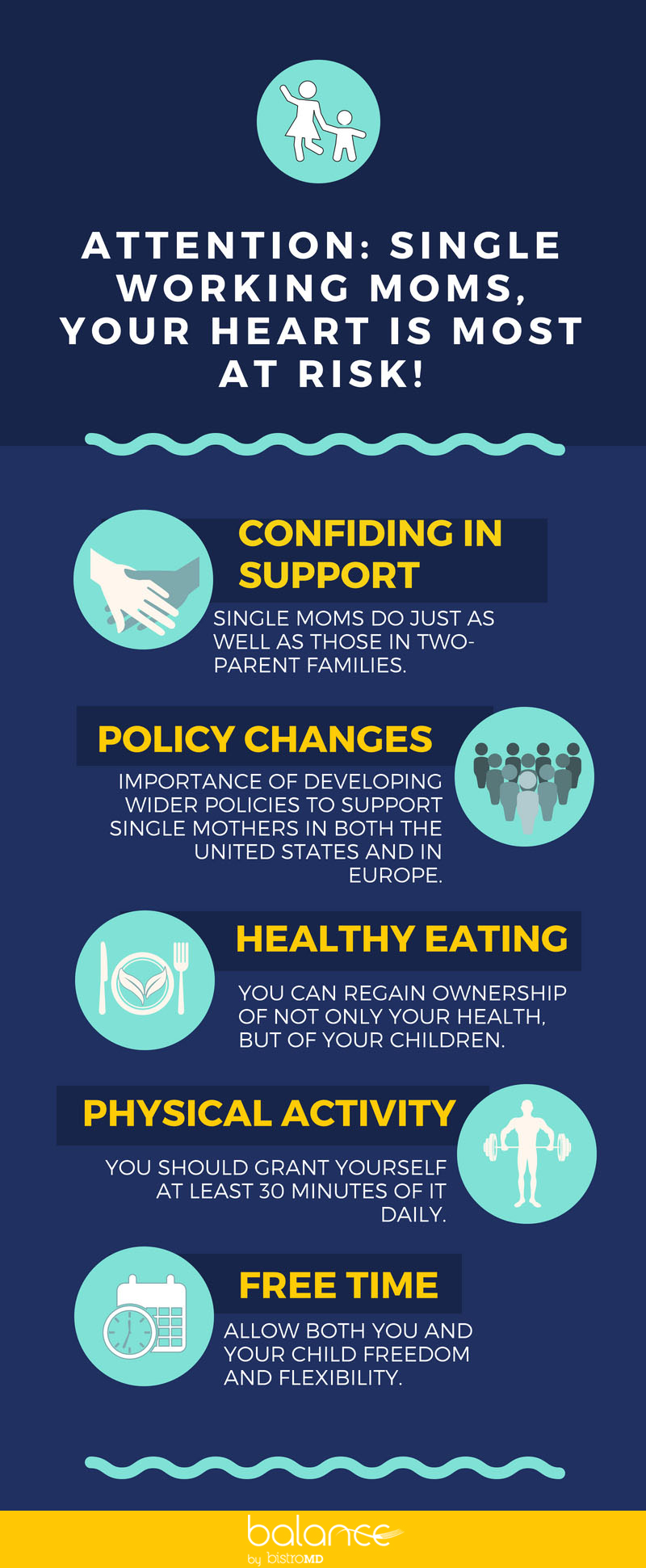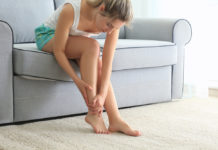The Single, Working Mom’s Heart
Published over a decade ago, a 2005 study found lone mothers were more likely to be current smokers, overweight or obese, and physically active than partnered mothers. Furthermore, those with clinical risks for cardiovascular disease, including diabetes, elevated C-reactive protein, high cholesterol, high blood pressure, or all of the above, were more likely to be lone mothers.
Fast forward to 2016, the link still bares to be true. Published in the American Journal of Public Health, researchers found single working mothers in the United States have a higher risk of heart disease and stroke compared to married mothers with jobs.
Why? Researchers hypothesize losing the support and second income of a partner may cause stress and result in unhealthy behavior, including smoking.
For the study, a group of researchers analyzed data coming from from the US Health and Retirement Study (1992 to 2006) and the Survey of Health, Aging, and Retirement in Europe (2004 to 2009). After analyzing the distinct work-family typologies of women born between 1935 and 1956 in the United States and 13 European countries, researchers found:
- Combining work and lone motherhood was more common in the United States. In fact, the odds of being a single working mother were twice as high in the U.S. as in Europe, with 11 percent of U.S. women in the study and 5 percent of the women in Europe having been in that role at some point in their lives.
- Compared to European women, U.S. women had nearly three times the risk of heart disease and more than double the risk of stroke.
- Overall, single working mothers had 1.4 times the risk of heart disease and 1.7 times the risk of stroke compared to married working mothers!
Additional findings published in the Journal of Epidemiology & Community Health also found single motherhood during early-adulthood or mid-adulthood is associated with poorer health in later life.

Re-Owning Health for You and Your Family
It is important to mention this is not a means for discouraging single moms, as lone parenting is highly admirable, but rather shift the focus on taking the reigns on personal health.
Re-owning health is not only vital for to support heart health, but helps lengthen precious and strong years of life to enjoy with your family. Single moms can embolden the health of their heart by:
Confiding in Support
There is some evidence showing kids of single moms do just as well as those in two-parent families, particularly related to the greater social support network they have!
Ultimately, former could be parents, other family, friends, neighbors or a nanny, while the latter included teachers, family doctors, pediatricians, television programs or articles about child rearing.
Advocating for Policy Changes
Along with linking the connection of lone parenting and heart health, researchers of the 2016 study highlight the importance of developing wider policies to support single mothers in both the United States and in Europe, which may include generous maternity leaves, affordable childcare, and more flexibility in work schedules.
Nonetheless, single moms and supporters are encouraged to advocate for such policy changes by educating yourself and others and supporting advocacy organizations.
Making Healthy Eating a Priority
While it may be easier to pop in that frozen pizza or run though the drive-thru, disregarding healthy eating can be taxing on the heart and overall health. But by making healthy eating a priority, you can regain ownership of not only your health, but of your children.
The American Heart Association (AHA) encourages single and working-parents to devise a meal plan and get kids in the kitchen, including by having salad and pizza nights on the weekdays. On a budget or is your child home alone? Consider a PB &J with no sugar added jelly on whole-wheat bread or fresh fruit for easy-to-prepare, budget-friendly meals and snacks.
Increasing Physical Activity
The importance of physical activity cannot be stressed enough for heart health and you should grant yourself at least 30 minutes of it daily.
But getting active does not always entail trips to the gym, as you and your little ones can get active together by walking the dog, biking around the neighborhood, joining a community center, or starting a garden.
Not only will you not feel guilty for doing these sort of things, but stand as a great role model for your kids!
Freeing Up Schedules
From attending sports events to helping with math homework, “busy, busy, busy,” is often the name of the game when it comes to parenting across the board.
However, it is absolutely okay to not overbook schedules and to allow both you and your child freedom and flexibility. Not only does this cut stress for you, but supports your child’s health. In fact, children need downtime, as being “bored” urges them to figure out how to keep themselves occupied and challenged, thus stimulating the mind and encouraging creativity.









